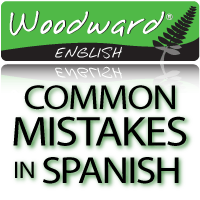
Many times when you don’t know a word in Spanish you can make a logical guess as to what it is.
If you see the word “problema” you can assume it means problem.
If you see the word “telefono” you can assume it means telephone.
If you see the word “interacción” you can assume it means interaction.
However, something you need to be aware of when you are learning Spanish is that there are words that appear similar to ones in English though in fact have a completely different meaning.
If you see the word “éxito”, it doesn’t mean exit. It actually means success!
If you want to say the word Exit in Spanish, you must use the word “salida”.
When a word looks or sounds similar in two languages though have a different meaning, they are called False Friends.
Here are some more examples of ‘false friends’ though here are many more that exist:
Campo is field and not Camp (which is campamento)
Codo is elbow and not code (which is código)
Decepción is disappointment and not deception (which is engaño)
Discusión is a heated argument and not a discussion (which is conversación or debate)
Delito is a crime and not delight (which is delicia or encanto)
Educado is polite or well-mannered and not educated (which is con estudios)
Fábrica is a factory and not fabric (which is tela o tejido)
Familiar is a relative and not familiar (which is conocido or común)
Ganga is a bargain and not a gang (which is pandilla)
Grabar is to recorde and not to grab (which is agarrar)
Idioma is language and not an idiom (which is modismo)
Introducir is to insert or put in and not introduce (which is presentar)
Mayor is older and not the English word Mayor (which is alcalde)
Molestar is to annoy/bother and not to molest (in a sexual way which is abusar sexualmente)
Once is the number eleven and not the English word once (which is una vez in Spanish)
Parientes are you relatives (extended family) and not parents (which is padres)
Pretender is to try/aspire and not to prentend (which is fingir)
Realizar is to carry out and not realize (which is darse cuenta)
Recordar is to remember and not to record (which is grabar)
Ropa is clothes and not rope (which is cuerda or soga)
Raro means strange and not rare (which is poco frecuente)
Sauce is a willow tree and not sauce (which is salsa)
Sensible is sensitive and not the English word sensible (which is sensato)
Sopa is soup and not soap (which is jabón)
Suceso is event/happening and not success (which is éxito)
Vaso is glass and not vase (which is florero or jarrón)
Be careful using excitado.
Excitado means you are sexually excited where as if you are just excited about something that will happen/did happen, you should use emocionado.
And then there is the classic:
Embarazada is pregnant and not embarrassed (which is avergonzado/a)
Have you ever said you were pregnant instead of saying you are embarrassed?
I have and you certainly get some strange looks saying it when you are a guy!!
The same happens when you are thinking of a word in English and how to say it in Spanish:
Advertise is anunciar not advertir (which is to warn)
Assist is ayudar not asistir (which means to attend)
Carpet is alfombra not carpeta (which is a folder or file)
Collar (of a shirt) is cuello and not collar (which is a necklace or collar of a dog)
Large is grande and not largo (which means long)
Library is biblioteca not librería (which is bookstore)
Check some more examples of false friends and other common mistakes
Have you ever used a false friend the wrong way?
Can you think of more examples of false friends?
